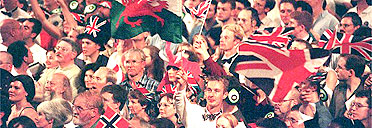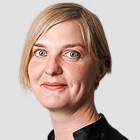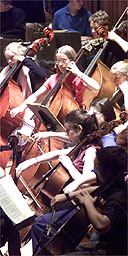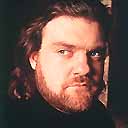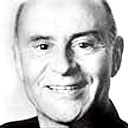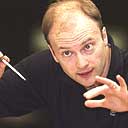Michael Berkeley, composer and artistic director, Cheltenham festival
If I had unlimited resources, I would use the Albert Hall for some way-out Stockhausen sonic experiment. And I would do an entire Ring Cycle. In an ideal world I would programme new work every night. I'd also like to experiment with huge mixed-media works, such as Steve Reich's Three Tales. Things that would really lift the roof off.
Joanna MacGregor, pianist and associate artistic director, Britten Sinfonia
The thing about the Proms is that it lasts for seven weeks - it's massive. So I would have festivals within the festival, centred around jazz, or early music, or world music. And I'd bring in directors to run them: it's impossible for one festival director to know everything about everything. I would also use the Proms as a way to let audiences hear core repertoire. I'd programme all the Beethoven symphonies, or all the Mozart piano concertos, and make it financially possible for people to go to every concert in that series.
I would programme cutting-edge concerts for young people - maybe bringing in performers such as Courtney Pine or the London Gospel Choir. The great thing about the Albert Hall is that it can take big performers like that.
And I would make them free for schoolchildren. If you want to encourage younger people, you have got to drop prices like crazy.
For the Last Night, I'd have some sort of musical marathon, with a party feel, that would reflect the multicultural Britain we live in today. There would be no Land of Hope and Glory.
Anton Lukoszevieze, cellist and director of Apartment House
I'd make the Proms into a contemporary music festival - which is what London is really lacking. Compare it with Berlin: there you can hardly leave your door without coming across a new music festival. The Albert Hall is a wonderful space, but I would also put noisy sound installations into the tunnel that runs from South Kensington tube station to the Albert Hall, and I would use the Serpentine Gallery for events.
The problem for the Proms is that the British don't like to experience anything that might make them choke on their cucumber sandwiches. We should be celebrating radicalism and novelty; instead we are stuck with this museum culture. Even the Proms commissions are generally pieces that will fit into traditional concert programmes without being noticed too much - quickly got out of the way between the overture and the symphony.
Nicholas Payne, general director, English National Opera
It's hugely wet of me to say so, but I am a huge admirer of Proms director Nicholas Kenyon, and of John Drummond before him. The big challenge for the festival now is how to use TV to reach a wider audience. But how do you do that in a way that's vivid and attractive? Do you build shorter programmes, chop them up, package the concerts differently? The problem is that blokes in white jackets sawing away at violins just isn't televisual.
It's a shame that they have reverted to all that ghastly Rule Britannia stuff for the Last Night, after last year's imaginative changes to the programme in the wake of September 11. This year we have gone backwards. There is nothing wrong with having a British flavour to the Last Night. But as it stands, it presents an image of Britain that makes no sense.
The more the Proms can celebrate the strength of British music-making, the better. It would be good to see Proms from Welsh National Opera and Opera North. Oh, and a Prom by English National Opera would be nice.
Roger Lewis, managing director and programme controller, Classic FM
The Proms is an absolutely inclusive festival of classical music. In fact, in tone and style it is in tune with what we are doing at Classic FM. I'd encourage Nicholas Kenyon to create even more access to the Proms for a broader audience. In an ideal world, all the concerts would be webcast.
Steve Martland, composer and artistic director of the Society for the Promotion of New Music
Nicholas Kenyon has made a brilliant festival for Classic FM listeners and people who live in the home counties - and there's nothing wrong with that. But a festival that long should be able to be more, and should present things that you can't see on any other day of the year. There is nothing radical or new or exciting about the Proms, and it has nothing to offer me and people like me. It's also a serious mistake for the Proms to programme pop music - that's just tokenistic.
David Pountney, director designate of Bregenz festival I would take as my starting point two opposite positions. First, that the Proms is traditionally a place where classical music meets a popular audience. Second, that it has also established a position, since it was run by William Glock in the 1960s, as a place where a lot of space is dedicated to new music. These two positions need to be brought together - by commissioning and creating new music that actually speaks to a broad public. What Glock did was to ruthlessly propagate modernism - thank God that era's all over - which left us with a gap between composers and audiences. It would be exciting if the Proms were to pursue a campaigning agenda to close that gap. As far as I'm concerned, most of the "conservative" new music is awful, whereas I really don't think that popular new music has to be crap.
Susanna Eastburn, artistic director, Huddersfield contemporary music festival
I would certainly put on and commission a lot of new music not only by British composers but from abroad. I also would want to get away from what I call new versions of old music, and programme composers who would think of ways of using the Albert Hall in a fresh way - who would take the orchestra, that fantastic instrument, in new directions.
Another of the great strengths of the Proms is also a difficulty: it is based around orchestral concerts. Although I have great respect for Nicholas Kenyon, I think he must have a real problem with the big international orchestras, who, instead of presenting music that is particular to the Proms, tend to bring in their ready-made summer programmes.
Graham Sheffield, artistic director, the Barbican Recently, the reach of the Proms has been extended away from core concerts in the Albert Hall: there are Proms in the Park and a number of associated education projects. But we have to remain aware that the Proms is not only an introduction to classical music; for some it's an advanced course. I don't think Nicholas Kenyon, whom I admire, has forgotten that, but I can see that the pressure to be populist could make it easy to get the balance wrong.
Steven Isserlis, cellist
If I were running the Proms, my difficulty would be to repress my personal passions: you can't have Schumann every night. Mind you, any artist who was rude about Schumann wouldn't be able to come . . .
I certainly wouldn't blow my budget to bring in huge, crowd-pleasing operatic stars. I would try to allow artists to fulfil their dreams, and get people to do projects they really believed in. If someone was passionate about, say, an obscure opera, I'd want to let them put it on. I'd like to get artists to hold open rehearsals and talk to audiences more. And I would use different venues, too, such as the Wigmore Hall.
The Last Night as it stands doesn't appeal to me greatly. I'd rather have Beethoven's Ninth Symphony - something humanistic rather than nationalistic.
Jonathan Reekie, chief executive, Aldeburgh Productions
I would start with the disadvantage of not liking the Albert Hall. In an ideal world, one would use a more intimate space that could still house large concerts, but did not have the Albert Hall's municipal feel.
Festivals should be a celebration; what one is celebrating in the Proms is orchestral music. I would want to be more focused on that, and not programme chamber music and so forth unless it sheds light on the orchestra itself.
In terms of programming, one would want to think not about big themes for the marketing department to get their teeth into, but threads in the programmes themselves. So that if you had heard all the Proms - which some people do - you would find that you had been taken on a variety of different journeys of discovery.
I'd also commission lots more new music. I'd want the Proms to be known as a place where orchestral music was heard for the first time. And I would ban overture-symphony-concerto concerts.
Serge Dorny, chief executive and artistic director, London Philharmonic Orchestra
In my fantasy Proms season, I would programme a series where the pure act of listening sets the agenda. At these "lucky dip" concerts, the audience wouldn't know in advance what they were going to hear. Programmes would only be available after the concert, so there would be no external frame of reference. You might discover music written in the 14th century (by Machaut, for example) that sounds like 21st-century music, or that a work that was written in the 20th century sounds 400 years old. There is scope to do this kind of thing because the Proms has an immensely loyal following.
I would also do a series of what I'd call "improbable" projects, which include an interactive visual element. For example, how about a three-concert series based around Wagner's Tristan und Isolde? The first concert would be Strauss's Metamorphoses and act one of Tristan; the second would be Schoenberg's Transfigured Night and act two of Tristan; the third would be Henze's Tristan and act three of the Wagner. During each concert there would be hundreds of TV screens around the hall, each showing a different production of the opera. So the audience would have different visual experiences, but a shared aural experience. It would be a multimedia experiment, and for those who listen at home, it could also incorporate the expanding interactive service provided by the BBC's broadcast and internet channels.
Finally, I would invite personalities (say Stephen Daldry, Peter Sellars, Nicholas Serota or Simon Rattle) to curate a festival-within-a-festival. These short series of concerts would provide a fresh focus each year and give an interesting insight into the musical aesthetics of some of our most influential cultural thinkers.
· The Proms are at the Royal Albert Hall, London SW7, from July 19. Box office: 020-7589 8212.
